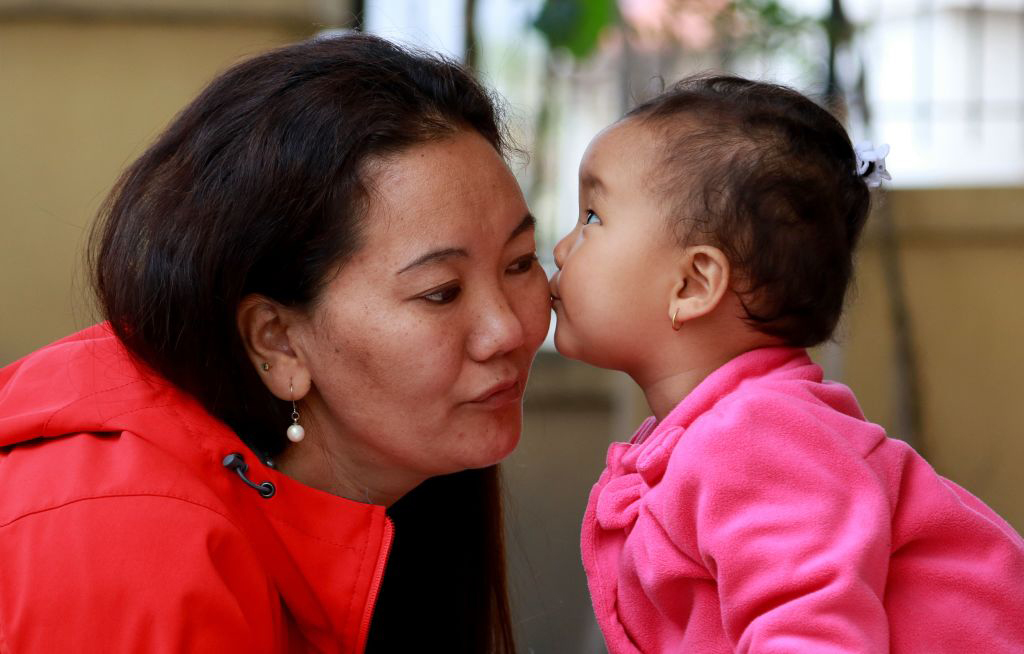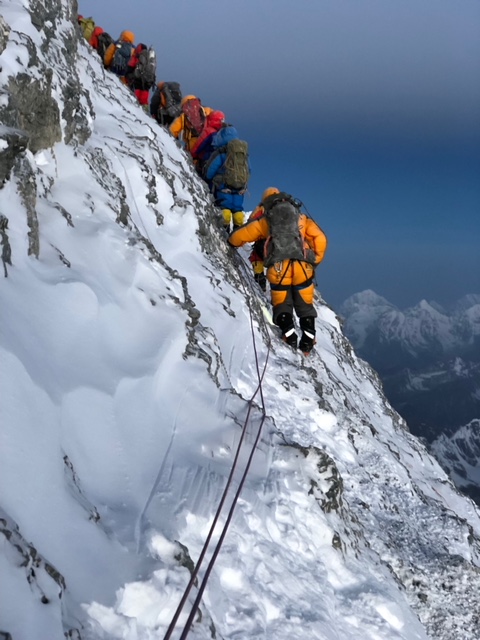On a mountain where records are categorized in every way—youngest, oldest, fastest, first—Lhakpa Sherpa has managed to stay under the radar despite holding the record for most Everest summits by a woman since 2003. This past spring, she summited Everest (29,029 feet) for the ninth time and the record she broke was her own. “I feel like climbing repairs my soul. It is, of course, very hard. But I love it. I am addicted. I have to go back, if I don’t I feel sick. Everest is therapy to me; it’s the best therapy for me,” she said. When she’s climbing she prays to the mountain. “I tell Everest things that happened in my life as if making confessions. Everest is like my mother in that respect.”
Lhakpa, who grew up above 13,000 feet in the Makalu region of Nepal, has devoted her free waking hours to becoming an accomplished mountaineer since she was a teenager. At 6:30am on May 18, 2000, after successfully petitioning the government and a few sponsors to fund an all-female expedition to the peak, Lhakpa stood on top of the world for the first time. She was 26 years old. “That first time I felt like I owned the mountain,” she said. “I felt like magic, or like a queen.”
Lhakpa’s successful descent back to basecamp secured her first record: She became the first Nepali woman to summit Everest and make it down alive (Pasang Lhamu Sherpa became the first Nepali woman to summit the peak in 1993, but died on the descent). Since then, the 46-year-old single mother of three has continued to quietly make history on the world’s tallest peak.

Lhakpa bids farewell to her niece as she prepares to leave for an expedition to Everest in Kathmandu on April 18, 2018. (Photo Credit: DIPEN SHRESTHA/AFP/Getty Images)
This coming spring, Lhakpa will again return to Everest, something she plans to do as long as her body is able. The accomplished mountaineer intends to summit the world’s tallest peak for the tenth time.
“I want my record to be hard to beat,” she says. This time, when Lhakpa heads to Nepal she’ll be leading the inaugural Everest expedition with the guiding company she started this year, Cloudscape Climbing. If all goes according to plan, Lhakpa’s clients will stand beside her on her tenth summit. Lhakpa’s goal is to get a younger generation interested in climbing, and to make bigger climbs more affordable for them. It’s an altruistic mission, but for Lhakpa it also provides a way to make an income doing what she loves most. “If I can lead clients, I can bring home money for my children. Also, I love climbing mountains.”
Lhakpa’s company also offers guided climbs up other peaks in the Himalaya, including Ama Dablam and Imja Tse or Island Peak (in the 6,000- to 7,000-meter or 20,000- to 23,000-foot height range), and higher, 8,000-meter (more than 26,000 feet) peaks such as Makalu and Manaslu. Additionally, the service leads day-hiking trips in Lhakpa’s New England backyard.
Lhakpa eventually wants to make Cloudscape her full-time job, but right now she works 40-hour weeks at a Whole Foods in West Hartford, Connecticut, washing dishes and taking out heavy bags of trash. Lhakpa calls that her training, and credits the physical nature of her work for keeping her strong. Before that she was a housekeeper, and before that she worked at a 7-Eleven.
In 2018, she caught the attention of Black Diamond Equipment. The outdoor gear company sponsored her 2018 climb, and plans to continue that support in 2019.
“Throughout everything in her life, she’s turned to climbing,” says the company’s content manager Chris Parker. “She works as a dishwasher and saves money to go climb. Our heritage at Black Diamond is in climbing and that resonates with us. When we met her it was just a no-brainer. We were wondering how she didn’t already have 10 sponsors. She’s a really powerful woman.”
Black Diamond plans to support whatever adventures she’s got eyes on next.

The outdoor gear company Black Diamond sponsored Lhakpa Sherpa’s 2018 summit of Everest and plans to support whatever she’s got planned next. (Photo Courtesy: Black Diamond)
“When people find out about my record, they are pretty surprised because I work a normal job,” Lhakpa says. Lhakpa never received any formal education, but she speaks Sherpa, Nepali, Hindi and Tibetan, and is taking classes to improve her English.
On most days she’s up at 6am getting her kids off to school. One of her daughters is in middle school, the other is in high school and her son is in college. Then, she does housework and gets food ready for when the kids come back. Around 2pm, she heads to Whole Foods for her shift and doesn’t get back to the apartment until late.
Lhakpa, a permanent resident who is working toward U.S. citizenship, moved here in 2002 with her now-ex-husband, and fellow Everest climber, George Dijmarescu. The couple had two children together (Lhakpa’s son is from a previous relationship), but divorced in 2015.
“I feel like a lot of bad things have happened in my life,” she says. But through it all, she’s always had climbing, and she’s always had Everest. As a single mom working long hours, she had to scrape together money to buy a plane ticket back to Nepal for the spring climbing season. Lhakpa summited Everest eight months after giving birth to her first daughter, and then again while two months pregnant with her second.
It’s difficult for Lhakpa to leave her children for two months every spring. She knows she needs to make it back to them safely, but she knows she has to go. And her daughters encourage her to keep climbing, to never give up.
Lhakpa grew up in the village of Balakharka in a small house she shared with her parents and 10 siblings. They didn’t have electricity and found entertainment in the nature and animals surrounding them. She looks back on her childhood fondly. “It feels like a dream now. I saw big mountains in my childhood and now I only see big buildings.”
Her father owned three teahouses, and her mother still operates those teahouses today. She’s always wanted to attend school but didn’t get the opportunity, as was the norm for Sherpa women back then. Instead she started working in the trekking business, becoming a porter at the age of 15. She often walked for eight hours a day, from camp to camp, carrying 80- to 100-pound loads. Then, her uncle hired her to work as a kitchen hand on Makalu. She quickly moved up the ladder and started carrying loads to basecamp. The next year she worked as a porter on Mera and Yala, smaller, non-technical trekking peaks in the area.
And while she wasn’t the only female porter, the role was regarded as a man’s job and people weren’t shy about letting her know that. “It felt bad to be told I was doing a man’s job. Nepali men didn’t accept women doing these jobs, and other women would also look down on it.”
The records Lhakpa has earned are important insofar as they help her live the life she desires. If she could climb all of the time, she would, and if Cloudscape becomes successful then maybe she’ll have found a way to do what she loves while also supporting her family.
“I want to inspire other single moms and dads,” she says. She’s proud of what she’s accomplished, but especially because of what she’s had to overcome along the way. She’s a single mother and a first-generation immigrant who has managed to reach the summit of Everest nine times. Lhakpa also has an eye on K2, the world’s second-tallest peak, which is known to be more technically difficult and dangerous than Everest.
“I want to show that women can do it.” she says. She’s had women come up to her and tell her that she’s inspired them, and she says she sees more women out climbing for themselves. That makes her happy. “My message is just to keep doing what they want and not give up. I am trying to show my daughters to follow their dreams and how to be tough.”
